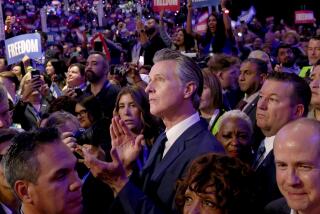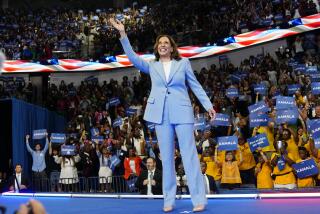Dean sticks to party’s rules
- Share via
WASHINGTON — Citing Democratic rules, national committee Chairman Howard Dean on Tuesday said that the superdelegates who are poised to select the party’s presidential nominee are free to back whomever they wish at the end of the primaries, regardless of who leads in the popular vote or pledged delegates.
“They should use whatever yardstick they want,” Dean said in an interview at party headquarters. “That’s what the rules provide for.”
Asked about Hillary Rodham Clinton’s suggestion that superdelegates should exercise independent judgment and not feel bound by the standings after June 3 -- the day the nominating season ends -- Dean replied: “That’s what the rules say, and I enforce the rules.”
He also said superdelegates were free to weigh the disputed primary results in Florida and Michigan, two states that New York Sen. Clinton carried in the absence of campaigning by rival Barack Obama. The two campaigns have spent weeks wrangling over a plan that would seat delegates from those states, which voted earlier than the party allowed.
Although his comments amounted to a restatement of party rules, Dean’s stance undercut an argument pressed by Illinois Sen. Obama and his backers. They have said the candidate who has the most pledged delegates should automatically win the support of any uncommitted superdelegates after the primary balloting ends.
Earlier Tuesday, House Speaker Nancy Pelosi (D-San Francisco) appeared to back away from that view.
“These superdelegates have the right to vote their conscience and who they think would be the better president, or who can win,” Pelosi said on ABC’s “Good Morning America.”
A spokesman later denied that Pelosi was shifting her view.
“Her position all along has been that these individual superdelegates will consider many issues when making a choice,” Nadeam Elshami said. “However, if it is perceived that the superdelegates as a whole overturn the will of the people, that would be harmful to the Democratic Party.”
Pelosi -- who like Dean has remained neutral in the nominating fight -- recently angered some Clinton supporters when she seconded Obama’s position that superdelegates should be guided by the vote for pledged delegates. Several major Democratic donors sent Pelosi a letter last week objecting to that stance.
Speaking Tuesday on National Public Radio, Pelosi dismissed the letter as unimportant. Dean agreed, rejecting the characterization of those who had called it a political ransom note. “This is a democratic society,” Dean said, “and they’re going to use lots of different angles to get what they want. And that’s their business.”
With fewer than a dozen contests remaining, neither Obama nor Clinton appears likely to win the 2,024 delegates needed to secure the Democratic nomination. That would leave the outcome in the hands of 794 superdelegates -- party leaders whose standing gives them a say in picking the nominee.
Obama leads Clinton in delegates chosen in primaries and caucuses, but Clinton leads Obama in superdelegate support, according to the Associated Press. Overall, Obama has 1,632 delegates to Clinton’s 1,500, according to the latest AP tally.
About 330 superdelegates remain uncommitted, and Dean said his only counsel was that they make up their minds -- “for their country’s sake and their party’s sake” -- no later than July 1. That position was endorsed Tuesday by Senate Majority Leader Harry Reid (D-Nev.), who has not sided with either candidate.
Dean expressed confidence that the nomination would be settled well before the party convention opens Aug. 25, saying the only way Democrats could fail to win the White House in November “is if we can’t heal this party.”
“The unpledged delegates . . . got their status because they were leaders of the party,” Dean said. “They have an obligation to lead, and that obligation means letting people know who you’re for well before the convention.”
Still, the chairman rejected the notion that he or any other party leader -- Pelosi, Reid, former Vice President Al Gore or former President Carter -- could step in and unilaterally end the nominating contest.
“Name one person in the last 40 years who’s done that,” Dean said, leaning forward in his chair. “There’s no power in the DNC to make people do things that the rules don’t prescribe.”
--
More to Read
Sign up for Essential California
The most important California stories and recommendations in your inbox every morning.
You may occasionally receive promotional content from the Los Angeles Times.











